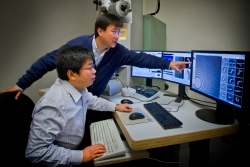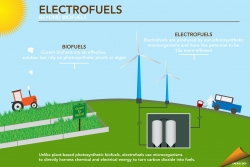
The protozoan Plasmodium falciparum gliding through a cell in the gut of a mosquito, its primary host. Although five different species of Plasmodium can cause malaria, Plasmodium falciparum causes the most severe disease. | Photo courtesy of Wikipedia Commons. Read more
Featured
New evidence shows how good cholesterol goes bad, which could improve the health and longevity of the estimated one in six Americans suffering from high blood cholesterol.
Biofuels produced here in the U.S. increase our energy security, but there is still a need for next-generation renewable fuels that can be integrated into the nation's current fuel refining and distribution infrastructure. If successful, electrofuels projects sponsored by ARPA-E could help fill this void.
Researchers at Brookhaven National Lab (BNL) are studying a tumor-suppressor protein called p53 to further the Office of Science’s long-standing mission to understand how radioactive materials affect the human genome.
Researchers at the Office of Science’s Joint BioEnergy Institute (JBEI) have tapped an unlikely source to help create a renewable alternative to diesel fuel.










